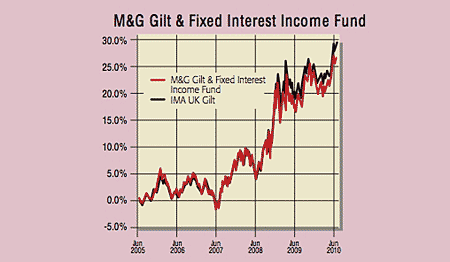Funds: How to profit from the deflation scare
Many analysts are now predicting a bout of global deflation. And this fund looks lke a good way to profit if you want to bet on deflation as the next big worry.

Get the latest financial news, insights and expert analysis from our award-winning MoneyWeek team, to help you understand what really matters when it comes to your finances.
You are now subscribed
Your newsletter sign-up was successful
Want to add more newsletters?

Twice daily
MoneyWeek
Get the latest financial news, insights and expert analysis from our award-winning MoneyWeek team, to help you understand what really matters when it comes to your finances.

Four times a week
Look After My Bills
Sign up to our free money-saving newsletter, filled with the latest news and expert advice to help you find the best tips and deals for managing your bills. Start saving today!
"For now the imminent danger is deflation," says John Authers in the Financial Times. Thanks to George Osborne's emergency budget, Britain faces an "age of austerity". Meanwhile, there is "violent agreement" on deficit reduction overseas. Last weekend's G20 meeting in Toronto echoed the sobering rhetoric of the British budget.
Internationally the only remaining area of discord is timing. While the US seems to favour a 'talk now, cut later' stance, Britain, following the path taken by several European nations such as Ireland is taking a 'cut now and cut deep' approach. There's much at stake: cut public spending too quickly and a double dip could become a depression if private-sector growth fails to pick up sharply enough.
Countering the deflationists are those who argue that the forthcoming rise in UK VAT from 17.5% to 20% (enough by itself to hike the consumer price index rate by 0.6%) means talk of price falls is premature.
MoneyWeek
Subscribe to MoneyWeek today and get your first six magazine issues absolutely FREE

Sign up to Money Morning
Don't miss the latest investment and personal finances news, market analysis, plus money-saving tips with our free twice-daily newsletter
Don't miss the latest investment and personal finances news, market analysis, plus money-saving tips with our free twice-daily newsletter
On the flipside lies the spending slowdown that could be triggered by big public-sector job cuts and pay freezes. As it is, unemployment rose in the three months to April and must surely rise further as 25% government departmental budget cuts arrive.
In the US, investors are braced for a grim non-farm payrolls figure analysts expect unemployment to rise above 9.7% as census work is scaled back. That comes as US core inflation (minus fuel and food) is at its lowest level since 1961.
So what should investors do about looming global deflation fears? Government bonds (gilts) are one option. Most pay a fixed coupon and are virtually 'risk free', being backed by the British taxpayer. And as deficit reduction gets underway, the British government should be borrowing less, and therefore issuing fewer bonds. That bodes well for the prices of those currently in circulation, even with yields already low. For example, in Britain analysts are already pencilling in a cut in debt issuance of around £20bn in 2010/2011.

This may not last. Indeed, if a double-dip arrives as we think it will, our politicians may well take fright and abandon austerity. But for now, if you want to bet on deflation as the next big worry, then the M&G Gilt & Fixed Interest Income Fund looks a good option. It has been outperforming its peers as gilt prices have risen in the run-up to, and following on from, the budget. The M&G fund also boasts a low annual expense ratio of 0.9% and no initial fee. It is managed by Jim Leaviss a professed deflationist and is up by 27% over three years.
Get the latest financial news, insights and expert analysis from our award-winning MoneyWeek team, to help you understand what really matters when it comes to your finances.
Theo is a former financial writer and editor, having written for reputable titles such as Euromoney Institutional Investor and Redwood Publishing. He has also appeared on-screen with Al Jazeera, BBC and CNBC and on MoneyWeek Theo covered funds, share tips and stockmarkets. He also edited the country's oldest newsletter with Lord Rees-Mogg for four years. Theo now runs his own content marketing agency for financial companies, and he is a seasoned CISI-qualified investment adviser.
-
 Should you buy an active ETF?
Should you buy an active ETF?ETFs are often mischaracterised as passive products, but they can be a convenient way to add active management to your portfolio
-
 Power up your pension before 5 April – easy ways to save before the tax year end
Power up your pension before 5 April – easy ways to save before the tax year endWith the end of the tax year looming, pension savers currently have a window to review and maximise what’s going into their retirement funds – we look at how
